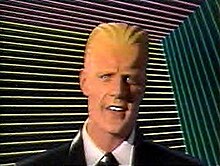| Max Headroom | |
|---|---|
| Max Headroom character | |
 | |
| First appearance | |
| Last appearance |
|
| Created by |
|
| Portrayed by | Matt Frewer |
| Voiced by | Matt Frewer |
| In-universe information | |
| Species | Artificial intelligence |
| Gender | Male |
| Occupation | Television host |
Max Headroom is a fictional character played by actor Matt Frewer. Advertised as "the first computer-generated TV presenter",[1] Max was known for his biting commentary on a variety of topical issues, arrogant wit, stuttering, and pitch-shifting voice. The character was created by George Stone,[2] Annabel Jankel, and Rocky Morton. Max was advertised as "computer-generated", and some believed this, but he was actually actor Frewer wearing prosthetic makeup, contact lenses, and a plastic moulded suit, and sitting in front of a blue screen. Harsh lighting and other editing and recording effects heighten the illusion of a CGI character.[3] According to his creators, Max's personality was meant to be a satirical exaggeration of the worst tendencies of television hosts in the 1980s who wanted to appeal to youth culture, yet were not a part of it. Frewer proposed that Max reflected an innocence, largely influenced not by mentors and life experience but by information absorbed from television.[3]
Max Headroom debuted in April 1985 on Channel 4 in the British-made cyberpunk TV movie Max Headroom: 20 Minutes into the Future, his origin story. In the movie, Edison Carter (portrayed by Frewer) is a journalist fleeing enemies into a parking garage, crashing his motorcycle through the entrance barrier reading "Max. headroom 2.3 metres" - UK vehicle clearance signs use the phrase "Max headroom". While Carter is unconscious, an AI program based on his mind is created. The AI develops a personality identified as "Max Headroom", and becomes a TV host who exists only on broadcast signals and computer systems. Like Carter, Max openly challenges the corporations that run his world, but using commentary and sarcastic wit rather than journalism.[4]
Two days after the TV movie was broadcast, Max hosted Channel 4's The Max Headroom Show, a TV programme where he introduces music videos, comments on various topics, and eventually interviews guests before a live studio audience. During its second and third year, it also aired in the US on Cinemax. Max Headroom became a global spokesperson for New Coke, appearing on many TV commercials with the catchphrase "Catch the wave!". After the cancellation of The Max Headroom Show, Matt Frewer portrayed Max and Carter in the 1987 American TV drama series Max Headroom on ABC. The series returns to Carter and Max challenging the status quo of a cyberpunk world, now portraying them as allies and providing a slightly altered version of Max's origin. The series was cancelled during its second year.
Max's appearance and style of speech has influenced and been referenced by different media, such as Ron Headrest, a fictional character in the comic strip Doonesbury who was a political parody of Ronald Reagan, and Eminem's 2013 "Rap God" video, in which the rapper resembles Max.[5] Max Headroom was emulated by an unknown person in a Max mask while hijacking a local television broadcast signal in 1987, later referred to as the "Max Headroom incident".[6][7] To advertise and promote Channel 4 and its subsidiary channels shifting from broadcast to digital signal, an aged Max Headroom (again portrayed by Frewer) appeared in new commercials in 2007 and 2008. Max has a cameo in the 2015 film Pixels.
- ^ Wogan, Terry (host) (14 August 1985). "Max Headroom". Wogan. BBC1.
- ^ "YouTube video at the ICA with Stone, Morton and Jankel". Archived from the original on 22 March 2016. Retrieved 3 October 2014.
- ^ a b Cite error: The named reference
vergewas invoked but never defined (see the help page). - ^ Max Headroom: 20 Minutes Into the Future. Channel 4 TV-movie (4 April 1985).
- ^ Cite error: The named reference
:0was invoked but never defined (see the help page). - ^ Cite error: The named reference
Rosswas invoked but never defined (see the help page). - ^ Cite error: The named reference
Schwochwas invoked but never defined (see the help page).